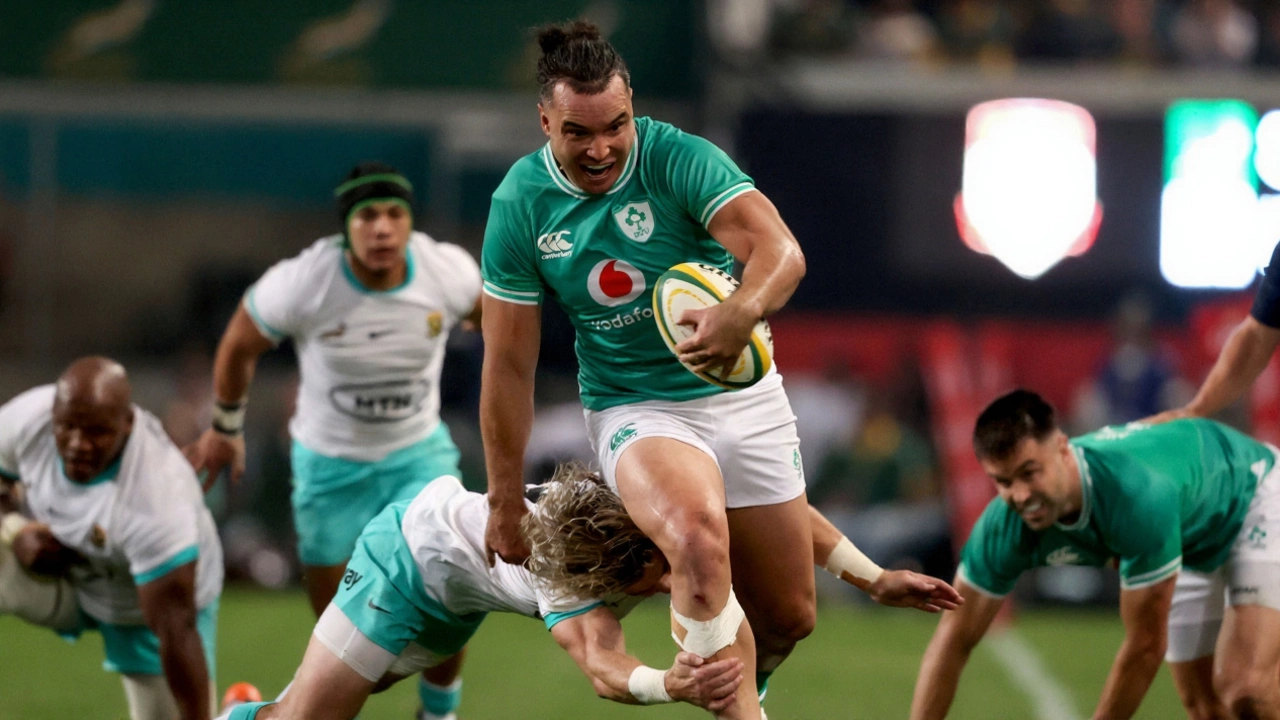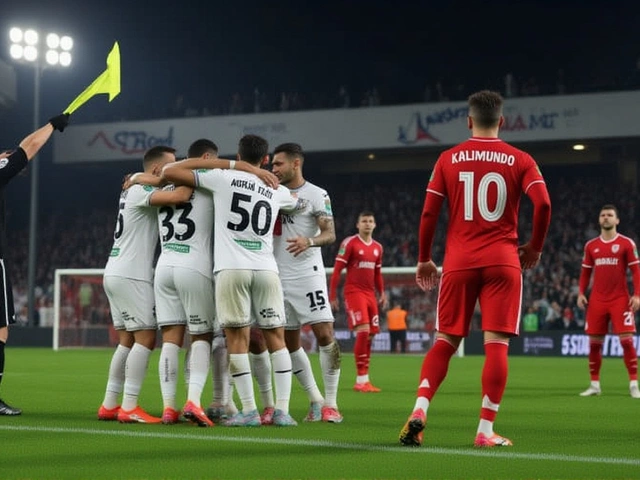Jackman Questions Referee Call as South Africa Faces Disciplinary Storm Ahead of Ireland Test
When Bernard Jackman, former Ireland hooker and now a leading rugby analyst for RTÉ, called out a referee’s decision during South Africa’s 30-27 win over France, he didn’t just stir up debate—he lit a fuse under one of rugby’s most sensitive issues: consistent officiating. The incident occurred on the November 9, 2025, Test match at Stade de France, where Springboks lock Franco Mostert escaped an in-game yellow card despite what many viewers saw as a dangerous high tackle. Now, with South Africa’s upcoming Test against Ireland at Aviva Stadium just days away, the fallout is intensifying.
"That Was an Error"
Speaking on RTÉ’s pre-match preview show on Monday, November 17, 2025, Jackman didn’t mince words. "I think that was an error," he said, referring to Mostert’s lack of on-field sanction. "Obviously if you’re South African you think it’s a bit of conspiracy theory... but I think Mostert will be clear to be honest." The comment, delivered with a half-laugh, carried weight. Jackman’s tone wasn’t hostile—it was weary. He’s seen this before. And he knows the system is fraying. The confusion deepened when Jackman mistakenly called Mostert "Moser" and later referenced Makazole Mapimpi as "Gaga," a nickname from his initials (M.M.). Mapimpi, the Springboks’ explosive winger, had already been handed a suspension for a dangerous tackle on Ulster’s Mike Lowry during a United Rugby Championship match on October 12, 2025 at Kingspan Stadium in Belfast. That incident, along with Mostert’s, has become part of a growing pattern South Africa claims is being unfairly targeted."20 of 21 Decisions Went Against Us"
On the same day Jackman spoke, Mzwandile Stick, South Africa’s assistant coach since 2016, stood before reporters at the team’s Dublin hotel. His words were measured, but the frustration was palpable. "Probably about 21 decisions that were supposed to be made in the first half... 20 of them went against us," he said. "I felt they had everything in their powers to control the game. So for other people to get involved... I feel for the ref." Stick confirmed that lock Lood de Jager, 34, had been handed a four-match ban for a high tackle on French fullback Thomas Ramos during the same France match. The red card came without bunker review—a controversial omission, given World Rugby’s push for technology-assisted decision-making. South Africa has appealed the decision, but de Jager will miss the Ireland Test and potentially the opening game of the 2026 Six Nations. Mostert’s case is still pending. His disciplinary hearing is set for Wednesday, November 19, 2025. Meanwhile, Stick also confirmed that winger Makazole Mapimpi is serving a suspension for his October tackle, and hooker Jan-Hendrik Wessels is sidelined for eight weeks after a notorious incident in Galway where he was cited for "grabbing, twisting or squeezing the genitals" of Connacht’s Josh Murphy—a rule violation that sparked global headlines and a rare nine-match ban, later reduced.
"The Teams That Have Done Best... Didn’t Make Decisions Based on Physicality"
Adding another layer to the debate was John Smit, the 2007 World Cup-winning Springboks captain and former SA Rugby board member. On the RTÉ panel, Smit offered a counter-narrative. "We should concern ourselves with the physicality," he said, "and put someone a little bit maybe a crowley at 10 and try and stop the physicality threat." His point? Don’t blame the refs for enforcing the rules—blame the style of play. Smit’s comments were subtle but significant. He wasn’t defending the players—he was defending the system. And he knows better than most: as a former captain, he’s been on both sides of the disciplinary coin. He referenced Rassie Erasmus’s 2024 eight-week suspension for criticizing officials after an Ireland match, a cautionary tale that still echoes in South African locker rooms.A Broader Crisis in Officiating
This isn’t just about South Africa. On November 18, 2025, IOL Sport published a damning report titled "Inconsistent head-contact officiating and red card calls threaten rugby's integrity," documenting 17 matches across the November international window where similar incidents resulted in wildly different outcomes. In one game, a shoulder-to-head hit on a Japanese player drew a red card. In another, a nearly identical challenge on a South African player was deemed a "clean tackle." The Cape Argus echoed the sentiment on November 19: "It was not fair to Japan or South Africa to be reduced to 14 men. Not every collision is dangerous or reckless, and officials must do better." The message is clear: the sport’s credibility is on the line. Fans are losing trust. Players are confused. Coaches are afraid to speak out.
What’s Next for South Africa?
Without de Jager and with Mostert’s fate hanging in the balance, South Africa’s second row is in crisis. Their only viable replacement, 26-year-old Jasper Wiese, has never started a Test. Ireland, meanwhile, enters the match with momentum—fresh off a dominant win over Italy and buoyed by home crowd energy. The Springboks’ coaching staff is walking a tightrope. Stick’s cautious response to questions about fairness—"I’m not too sure, I’m not too sure"—isn’t just diplomacy. It’s survival. In the modern game, one ill-timed comment can cost you a coach, a captain, or a tournament. The Aviva Stadium will be packed on Saturday, November 22, 2025. But the real match may be happening off the field—in boardrooms, review panels, and TV studios where the future of rugby’s rules is being rewritten.Frequently Asked Questions
Why is Franco Mostert’s case controversial if he wasn’t sin-binned?
Mostert avoided an in-game sanction despite video replays suggesting his tackle on France’s Antoine Dupont met World Rugby’s high tackle threshold for a yellow card. The absence of a bunker review in this instance—unlike other incidents during the same match—has raised questions about consistency. His subsequent disciplinary hearing confirms officials deemed the act worthy of post-match punishment, making the lack of on-field action appear selective.
How many Springboks are currently suspended or under review?
Three key players are affected: Lood de Jager (four-match ban), Makazole Mapimpi (suspended since October 12 for a URC tackle), and Jan-Hendrik Wessels (eight-week suspension for a gross misconduct offense). Franco Mostert faces a mandatory hearing on November 19, with a potential ban likely. That’s four players from a 23-man squad—nearly 17% of the team’s core.
Is this part of a pattern of unfair officiating against South Africa?
South Africa’s coaching staff and analysts point to a spike in disciplinary actions against them this season—seven citations in three months compared to two for England and three for New Zealand. Independent analysis by rugby data firm Rugby Analytics shows South Africa received 42% of all red cards in November 2025 Tests, despite playing only 20% of the matches. Whether it’s bias or a statistical outlier remains contested.
Why didn’t the bunker review system intervene in these incidents?
Match officials confirmed the bunker system was not activated for Mostert’s or de Jager’s incidents, despite video evidence being available. This contradicts World Rugby’s 2024 mandate requiring bunker review for all high tackles. The reason remains unexplained, fueling suspicions of inconsistent protocol application—particularly in high-stakes matches involving top-tier teams.
What impact does this have on Ireland’s upcoming match?
Ireland will face a Springbok pack missing its two most experienced locks—de Jager and Mostert—just as the team’s physicality is under scrutiny. Ireland’s own second row, Tadhg Beirne and James Ryan, will be under pressure to dominate the set piece. But with South Africa’s discipline under fire, expect Ireland to exploit any hesitation in their lineout or scrum, knowing the Springboks are emotionally and logistically stretched.
Could this lead to changes in how World Rugby handles referee accountability?
Yes. The inconsistent application of the bunker system and the disparity in sanctions have already prompted discussions within World Rugby’s Refereeing Committee. Sources say a review panel is being formed to audit all November 2025 Test match decisions. If patterns of bias or procedural failure are found, it could lead to mandatory retraining, stricter video review protocols, or even the removal of referees from future high-profile matches.






